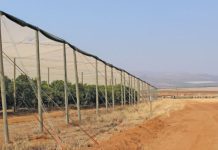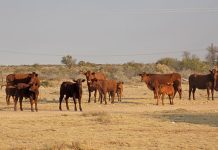So You feel strongly about the image of commercial farmers?
It’s imperative they align themselves with consumers. The commercial farming sector is way too defensive and must get involved in the plight of the poorest of the poor. I understand the complexities of commercial farming – my husband and I have been farming in the Viljoenskroon district for many years.
Farmers market themselves terribly badly, given the fact they stand between food security and insecurity. They’re the backbone of food production in the country. You and I know this, but the general perception remains that farmers are responsible for high food prices. The sooner farmers get involved in finding solutions for food provision, the better. SA’s agricultural sector could never have survived without the creativity and dedication of commercial farmers, and this should be communicated to the public. They must be seen as the solution to food insecurity, not the cause of it.
The biggest problem is that agriculture has the potential to be seen in a political light, inhibiting commercial farmers from reaching their full potential in SA society. Commercial farmers are limiting their role by keeping to themselves, as well as the future role their children could play in shaping our country.
Farmworker eviction is a contentious issue in SA. What is the DA’s take on this?
It’s extremely difficult to react on allegations and accusations of farmworker evictions without supporting evidence and statistics.Government continuously latches onto this issue. We abhor unlawful evictions, but it’s very difficult to form an idea of the extent of the problem without evidence. We’re bombarded by allegations of evictions in parliament and although we don’t believe it’s as rampant as government claims, we find it very difficult to refute allegations without supporting evidence.
We urge organised agriculture to supply us with as much statistical evidence as possible in order to disprove the damaging claims made by politicians.Food inflation is rocketing sky high.
What should be done and by whom?
We prefer a variety of general policy alternatives. We strongly recommend support for vulnerable groups in the form of food stamps and food aid, the possible establishment of cash-for-food programmes through the Expanded Works Programme and the expansion of school feeding programmes, among others.
The fact is, however, that increasing food prices will persist in the medium term. Food prices may begin to decline with demand response to higher prices, but it’s unlikely that prices will fall bellow 2004 levels for some time. It’s unlikely because of the impact of policies aimed at reducing carbon dioxide emissions, which may present strong trade-offs with food security objectives in terms of the interests that dominate our global dispensation.
Overall, there should be effective communication on the reasons for food price inflation and policies for addressing it in a sustainable manner. Government has yet to issue a comprehensive statement on its view of food inflation and how it plans to address the problem. This has left the door wide open for knee-jerk populist calls from the left for moratoriums on food prices and other forms of regulation. Such interventions will not only lead to empty shelves, but will also detract from our ability to address broader underlying issues such as the unfair trading system.
How do you see land reform and the new Expropriation Bill in particular?
We are in favour of a sustainable, equitable and just land programme. However, we feel the new Expropriation Bill is manifestly unconstitutional. The Bill is but one example of how government has been playing the hapless victim in the land reform process.
While there’s no doubt the state is lagging behind in its commitment to redistribute 30% of agricultural land to black owners by 2014, this not because of “distortions and imperfections in the land market”, or because of obstructionist behaviour by landowners. It’s due to a lack of initiative and ineffective management and regulation bygovernment. Ultimately, government must do more to speed up land distribution through existing policy provisions which adhere to the constitution. The willing basis of transactions in land must be honoured, because abandonment of this principle would jeopardise not only land reform, but the stability of the economy as a whole.
If government is determined to push the expropriation legislation through, the DA will support any proposed Constitutional Court action and will, if necessary, consider taking the route itself.Biofuel production is also a contentious issue, especially the fact that maize will probably not be considered as a feedstock. Your standpoint?
It’s clear that we can’t have a situation where the use of food crops for biofuel will negatively impact on food security. However, in light of our particular circumstances, this may also represent a unique prospect. Currently, 37% of high-potential arable land is held communally, mostly in the rural Eastern Cape. For these impoverished communities, the cultivation of maize for biofuel production may represent the opportunity they need to improve their economic situation. If SA can meet its human and stock feed requirements, there should be no reason why communities may not be allowed to use this opportunity.
What is the solution for the skills shortage in agriculture?
The acquisition and retention of skills is a problem across all sectors and government has failed to deal with it, despite having some very involved programmes to address the issue. Chief among our concerns is the large amount of red tape under which skills development has been buried and the manner in which employers have been marginalised in determining and running our national skills-development regime. SA needs a skills-development regime which is lean and responsive to the needs of our market, and employment-centred. It should not add to the burden of employers, but rather become an incentive for those wishing to up-skill their business concerns. In the agricultural sector employment legislation, the manner in which land reform has been implemented and infrastructural issues have lead to further decay.
It seems as if the HIV/Aids pandemic is gaining momentum in agriculture. What should be done?
If government had not got sidetracked by the egos of senior politicians and the policies of politics, it’s probable we would have seen a timeous and proper roll-out of ARV-supply programmes, as well as the introduction of dual-therapy ARV treatment, which already became international best practice four years ago. We have calculated some 100 000 babies have been born infected with HIV, because of the four-year delay in the introduction of dual therapy.
In terms of the agricultural sector, HIV/Aids education deserves much more attention. Employees in the sector need to be better educated about healthy living, the dangers of alcohol abuse and the use of contraceptives. For those already infected, sticking to treatment schedules and making sure they get the necessary nutrition is important. |fw








